“Luckily, this time they didn’t cut it too short. Did you change barbers?”
“No, there’s one near the house, it’s not worth it. And then what do I care about my hair, it’s already white, yours that’s young and beautiful is what counts.”
I ignored the allusion to the beauty of my hair, I found it out of place. I said:
“It’s not white, you just have a little gray at the temples.”
“I’m getting old.”
“When I was little you were much older, you’ve gotten young again.”
“Suffering doesn’t make you younger.”
“You obviously haven’t felt enough of it. I know you’re back in touch with Mariano.”
“Who told you that?”
“Mamma.”
“It’s not true, but we meet sometimes, when he comes to see his daughters.”
“Do you fight?”
“No.”
“Then what’s not right?”
There wasn’t anything that wasn’t right, he just wanted me to understand that he missed me, and that my absence was painful to him. Sometimes he acted the part so well that I forgot I didn’t believe him. He was still handsome, he hadn’t gotten thin like my mother, he didn’t have rashes on his skin: falling into the net of his loving voice, sliding again into childhood, confiding in him was easy. One day, while as usual we were eating panzarotti and pastacresciuta after school, I said impulsively that I wanted to read the Gospels.
“Why?”
“Is that bad?”
“It’s very good.”
“What if I become a Christian?”
“I don’t see anything wrong with that.”
“What if I get baptized?”
“The important thing is that it not be a whim. If you have faith, it’s fine.”
No opposition, then, but I immediately repented that I had told him of my intention. To think of him as an authoritative person, worthy of love, now, after Roberto, seemed intolerable. What did he have to do with my life anymore? I didn’t want in any way to restore to him authority and affection. If I ever read the Gospels, I would do it for the young man who had spoken in church.
7.
That attempt—failed from the start—to get close to my father again intensified my desire to see Roberto. I couldn’t resist and decided to phone Vittoria. She answered in a voice that was depressed, hoarse from cigarettes, and this time she didn’t attack or insult me, but she wasn’t affectionate, either.
“What do you want?”
“I want to know how you’re doing.”
“I’m fine.”
“Can I come see you one Sunday?”
“To do what?”
“To say hello. Plus I was glad to meet Giuliana’s fiancé: if he’s back in this area, I’d happily come and see him.”
“They’re not doing anything in church anymore, they want to get rid of the priest.”
She didn’t give me time to tell her I’d run into Don Giacomo and knew all about it. She switched into very heavy dialect, she was mad at everyone, the parishioners, the bishops, the cardinals, the Pope, but also at Don Giacomo and even Roberto.
“The priest overdid it,” she said. “He was like medicine: first he cured us, then came the side effects, and now we feel much worse than before.”
“And Roberto?”
“Roberto takes the easy way out. He comes, throws things into disarray, and leaves, you don’t see him for months. Either he’s in Milan or he’s here, and that’s not something that’s good for Giuliana.”
“Love, yes,” I said, “love does no harm.”
“What do you know?”
“Love is good, it overcomes even long absences, it stands up to everything.”
“You don’t know anything, Giannì, you speak in Italian but you don’t know anything. Love is opaque like the glass in the bathroom window.”
That image struck me, I immediately had the impression that it contradicted the way she had recounted her romance with Enzo. I praised her, I said I wanted to talk to her more, I asked:
“Sometime when you all have lunch together—you, Margherita, Giuliana, Corrado, Tonino, Roberto—can I come, too?”
She was irritated, she turned aggressive.
“Better for you to stay home: that, according to your mother, is the place for you.”
“But I’d like to see all of you. Is Giuliana there? I’ll make arrangements with her.”
“Giuliana is at her house.”
“And Tonino?”
“You think Tonino eats, sleeps, and shits here?”
She hung up abruptly, rude, vulgar as usual. I would have liked an invitation, a definite date, the certainty that even in six months, in a year, I would see Roberto again. That hadn’t happened, and yet I felt pleasantly agitated. Vittoria had said nothing clear about the relationship between Giuliana and Roberto, but I had understood that there were some stumbling blocks. Of course, one couldn’t depend on my aunt’s assessment, in all likelihood what disturbed her was exactly what made the couple happy. Yet I fantasized that with perseverance, with patience, with the best intentions, I could become a kind of mediator between them and my aunt: that is, a person who could speak everybody’s language. I looked for a copy of the Gospels.
8.
I didn’t find one at home, but I hadn’t reckoned with the fact that with my father it was enough to mention a book, because he immediately got it for me. A few days after our conversation, he appeared outside school with an edition of the Gospels with commentary.
“Reading isn’t enough,” he said. “Texts like these have to be studied.”
His eyes lit up as he uttered that statement. His true existential condition was revealed as soon as he was dealing with books, ideas, lofty questions. At that moment, it became clear that he was unhappy only when his head was empty and he couldn’t hide from himself what he had done to my mother and me. When, instead, he devoted himself to great thoughts supported by meticulously annotated books, he was happy, he lacked nothing. He had transferred his life to Costanza’s house and lived there in comfort. His new study was a large luminous room with a window overlooking the sea. He had resumed the meetings with all the people I remembered from childhood, apart from Mariano, naturally, but the fiction of a return to order was now solidified, and you could predict that soon Mariano, too, would return to the debates. So the only thing that spoiled my father’s days was the empty moments when he found himself face to face with his offenses. But it didn’t take much to sneak away, and that request of mine was surely a good opportunity, it must have given him the impression that things were returning to normal even with me.
In fact, he promptly followed the commented edition with an old volume of the Gospels in Greek—the translations are good but the original text is crucial—and then, without a break, he pressed me to ask my mother to help him resolve some very boring matters of certificates or some such thing. I took the book, I promised to talk to her. When I did she got huffy, grumpy, sarcastic, but gave in. And although she spent the days in school or correcting homework and proofs, she found the time to wait in long lines at the windows of various agencies, fighting with lazy bureaucrats.
It was then that I noticed how I myself had changed. I was barely indignant at my mother’s subservience when from my room I heard her announce to him on the phone that she had done it. I wasn’t furious when, her voice burned by too many cigarettes, by drinking gin at night, she softened and invited him to come by and get the documents that she had tracked down at the registry office, the copies she had had made at the national library, the certificates she had obtained for him from the university. I wasn’t even too hostile when, one night, my father showed up, looking discouraged, and they talked in the living room. I heard my mother laugh once or twice, then that was it, she must have realized that it was a laugh from the past. In other words, I didn’t think: if she’s stupid so much the worse for her; now I seemed to understand her feelings. My attitude toward my father fluctuated more. I hated his opportunism. And I darkened when he called to me to say hello, and casually asked:
Читать дальше

![Элена Ферранте - История о пропавшем ребенке [litres]](/books/32091/elena-ferrante-istoriya-o-propavshem-rebenke-litres-thumb.webp)
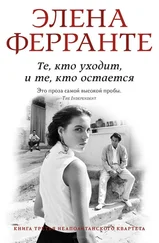
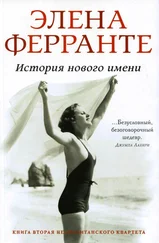
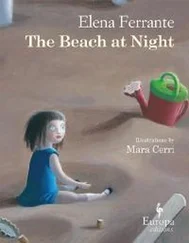

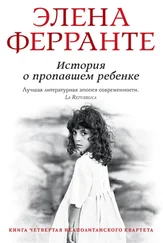
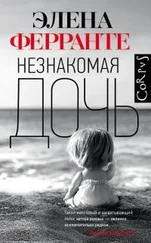
![Элена Ферранте - Дни одиночества [litres]](/books/404671/elena-ferrante-dni-odinochestva-litres-thumb.webp)



